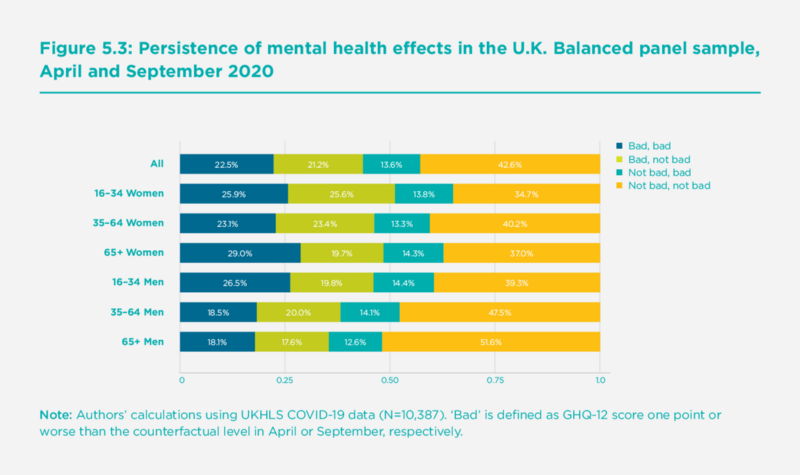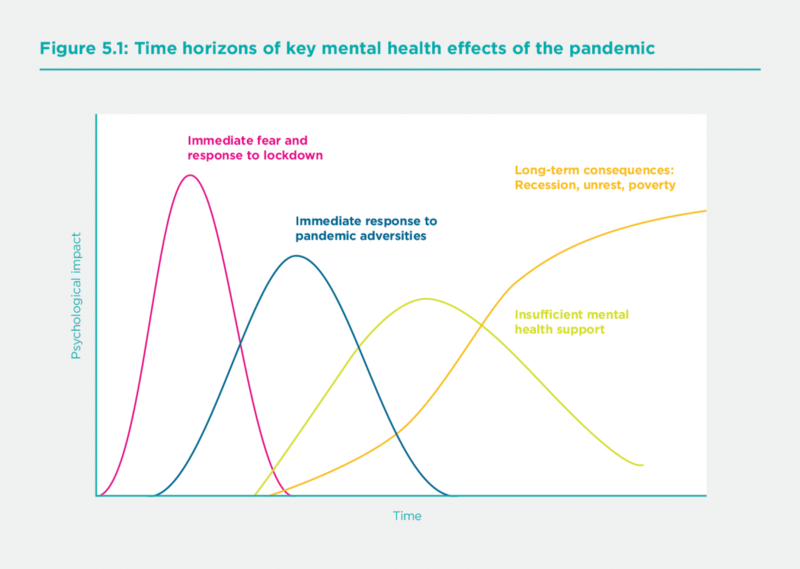Initially, the pandemic had a significant and negative impact on our mental health. Here is some data that looked at self-reported levels of distress, anxiety, and depression across the USA in 2020:

As you can see, anxiety, depression and distress all spiked in March and April but remained relatively consistent from June 2020 to January 2021.
By September 2020, the average mental health of all people in the UK was still 2.2% worse than was predicted if there had been no pandemic. However, it wasn’t anything like the initial rate of people’s mental health being 7.9% worse at the start of the pandemic.
The pandemic has not impacted everyone’s mental health in the same way. If we look at the data of people surveyed in the UK in both April and September 2020, more than one in five people had their mental health significantly impacted at both time points. However, both women and younger people were affected more by COVID-19 than older men:

There is also some evidence that suggests that ethnic minorities and those with pre-existing mental health conditions were impacted more severely by the pandemic. Unfortunately, these impacts only further exaggerate many of the already existing mental health inequalities.
Lockdowns didn’t seem to worsen people’s mental health as severely as people imagined. Similar to what Daniel Gilbert said in his surprising book, ‘Stumbling on Happiness’, we can adjust more to whatever happens to us the longer it goes on. If something positive happens to us, we imagine that we will feel way better for way longer. But eventually, we get used to it, and our happiness levels return close to what they initially were. On the other hand, if something terrible happens to us, we imagine it will impact our mental health way worse and for way longer than it typically does. By June 2020, many people had already found their new equilibrium.
By comparing internet searches before and during lockdowns, Google searches increased the most substantially for boredom. Statistically significant increases also occurred for loneliness, worry and sadness. Other studies had also found increased searches for psychological stress, fear and death before lockdowns started. These searches then stabilised at the start of the lockdowns before reducing as the lockdowns continued.
Another finding that may surprise many people is that searches fell for divorce and suicide once countries imposed lockdowns.
I’m not sure if this is true, but I have heard that suicide rates also decrease during wars. So even though many people feared that lockdowns would increase suicidal ideation, I think that sometimes wars and pandemics give us a reason to feel sad. stressed or worried. Understanding why people feel the way they do and why they have to do what they are doing gives them insight and meaning and hope that things will get better in the future. Which can reduce the risk that someone will want to die by suicide instead of increasing it.
Possible future mental health consequences of the COVID-19 pandemic
Although most countries are now out of their most severe lockdowns and many people are returning to a new sense of normalcy, we are not entirely in the clear yet.
The following graph by Banks, Fancourt and Xu in Chapter Five of the 2021 World Happiness Report indicates that we are now in phases three and four:

The COVID-19 pandemic has brought on more awareness of the need for mental health treatment worldwide.
However, there is still insufficient mental health support in many places. One of the latest figures I saw from the World Health Organisation suggested that somewhere between 75 and 95% of people in need of mental health services in low- and middle-income countries cannot access adequate mental health support.
Even where I was working in Melbourne, Australia, in 2020, there was a shortage of psychologists who could take on new clients because the demand for mental health services was so high.
Therefore, countries need to find new ways to increase access to evidence-based mental health treatments and support. It is especially true for disadvantaged or discriminated against groups, as they are likely most impacted by the COVID-19 pandemic.
Many of the long-term consequences of the COVID-19 pandemic are still not fully known. People have died, jobs have gone, businesses have closed, products have become harder to find or more expensive. Inflation and interest rates may have to increase to keep up with the printing of money and the countries’ spending during the pandemic so far.
There are lots of uncertain things about the future. Each of these things may come with potentially negative mental health impacts too. I am probably less cynical and more hopeful than the graph above shows about how people respond over time, but no one can fully predict what lies ahead.
Dr Damon Ashworth
Clinical Psychologist

Interesting observations. I was fortunate to already have a relationship with a therapist. I also found Anderson Todd and John Vervaeke videos helpful for different perspectives. I even took to meditating. I certainly agree that the ripples will be reverberating for some years yet. Hopefully some learning finds new purchase along the way.
LikeLike
Yes I hope so too!
LikeLike
I suspect that the inability to access in-person mental and physical health care will have negative effects that won’t be fully apparent until sometime down the road.
LikeLike
I agree. Especially for the most vulnerable people
LikeLike
Very informative! Thank you for this, Dr. Damon.
LikeLike
Thank you!
LikeLike
Any ideas why young men and old women were most impacted? I wonder if elderly men fear death less than elderly women.
LikeLike
Yes, it’s interesting. I do think that older men in general are less likely to admit to feeling worse. Women have also been impacted more from an occupational standpoint than men, and have maybe had to take on more of the burden of looking after the kids and the household more. With the younger generations, I know that it has impacted them a lot not being able to see their friends or travel or go out as much as they would like to. I’d say that there would be a number of different factors.
LikeLike
Makes sense. Thanks for elaborating.
LikeLike
How much of the current wave of mental illness is exacerbated by the panic mongering by pharma’s marketing contractors? Here I note that the contractors include:
iHeartMedia
VMLY&R
Fors/March
Public Good Project.
LikeLike
We should probably remember the observation from “Dune”: “Fear is the mind-killer.” We don’t think clearly about ramifications when we are in the grip of strong emotions–fear, anger, grief, love.
LikeLiked by 1 person
We should also consider the ramifications of mask mandates and vaccine mandates. First, the mandates remove our options, thus damaging our freedom. The value of both masks and vaccines is disputable and controversial. In damaging our freedom for disputable benefits, these mandates undermine our mental health.
Humor and hugs provide both immune and mental health benefits, so the public manipulation to fear our fellow man and to fear infecting our fellow man is damaging to both our immunity and our mental health, since fear undermines humor and leads us to avoid hugging our loved ones for fear of infecting them.
If you had told me back in 2019 that the antisocial behavior in America of masking and social distancing would become the norm, I wouldn’t have believed you.
LikeLike
A really interesting post Damon and some of the stats certainly surprised me. I was expecting worse. I agree though, that there is uncertainty about the long-term impact of COVID on mental health. Nice to see someone being optimistic though as in my experience it tends to be the other way around 🙂 Thanks for your insight!
LikeLiked by 1 person
Thanks for the comment. I find it interesting how people create stories based on what they think rather than what the data shows. Yes, COVID has negatively impacted our mental health, but not as much as it did at the start, and not like many people imagine. Of course, the impact would still be very high for some people, but I also do find it amazing how over time, we get more used to whatever we are going through and, therefore, less affected.
LikeLike
Thanks for sharing, Very informative
LikeLiked by 1 person